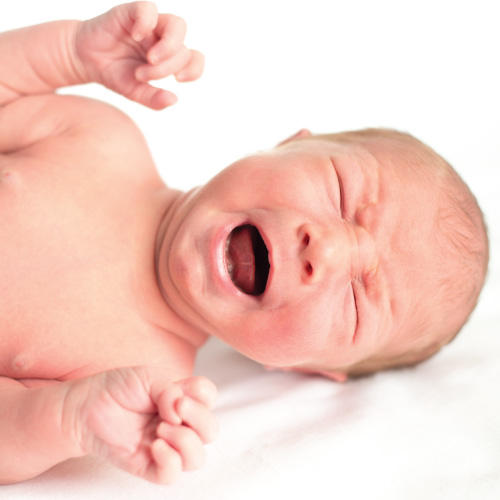'Crying it out' not healthy?

Some people believe in allowing a newborn to 'cry it out' if they don't go to sleep on their own. However, newborns cry for a reason - they certainly don't cry to misbehave or because they are bored. They don't know what these things are.
A study, undertaken at the University of North Texas in 2012, had mothers waiting in a room while allowing their newborn to 'cry it out' next door, in the hope of them finally falling asleep and learning that this was going to be their normal pattern for bedtime. It was found that although infants do learn to fall asleep, their bodies still release the stress hormone, cortisol.
In the leading author's words, 'On the third day of the programme, results showed that newborn's physiological and behavioural responses were dissociated. They no longer expressed behavioural distress during the sleep transition but their cortisol levels were elevated. Although the infants exhibited no behavioural cue that they were experiencing distress at the transition to sleep, they continued to experience high levels of distress, as reflected in their cortisol scores.
Overall, outward displays of internal stress were extinguished by sleep training. However, given the continued presence of distress, the newborns were not learning how to internally manage their experiences of stress and discomfort.'1
The functions and effects when cortisol is secreted into the blood stream are;
- regulation of blood pressure
- insulin release for blood sugar maintenance
- a weakening of the overall potency of the immune system
- inflammatory regulation
- an increase of gastric acid secretion
- an indirect reduction of bone formation from lowered absorption of calcium in the intestines
- a quick burst of energy for survival reasons
- heightened memory functions to emotional responses
- lowers sensitivity to pain
- helps maintain and regulate internal balance in the body
With the negative impacts of 'crying it out' scientifically proven, it is fair to say, the quicker your response to your newborns cry the more you enhance positive brain development. Thus creating deeper bonds of love and attachment which become the basis of emotional memory for your newborn.
In relation to digestion, the quicker you respond to your baby's cry, the less tense their body is. This makes it easier for them to release wind and to settle back off to sleep. You can find out what to do when you cosy bubs into bed and they become unsettled in my BabyCues book.
Is there any point where 'crying it out' is helpful?
The only time 'crying it out' is appropriate is when your newborn has become old enough to test boundaries by playing up at bedtime. Leaving them be can work wonders here. The difference between this age and a newborn is quite simple. The infant or child – in an ideal upbringing – has already learnt to feel secure within your providing of love and their environment, and is now testing boundaries through further communication.Newborns are not testing anything out. They are instinctively reacting to something that is happening for them. The best thing you can do is read their cues and respond accordingly. This kind of attentive nurturing is highly advantageous to neural advancement in the early months of life.
Digest this fact
It is a fallacy that newborns inconsolably cry because they are tired. A newborn with comfortable digestion and whom feels tired will fall asleep and stay asleep for good periods of time. Yes, they may grizzle and whimper, but not cry with clenched fists and obvious tension within their body.
For ways to settle your baby while forming beneficial, long term sleep habits, contact Philippa.
1. Child Development. 2000 Jul-Aug; 71(4):862-77. Behavioural and physiological responsivity, sleep, and patterns of daily cortisol production in infants with and without colic. White Bp, Gunnar MR, Larson MC, Donzella B, Barr RG University of New Hampshire, Durham, USA.
Photo used Designed by Freepik


